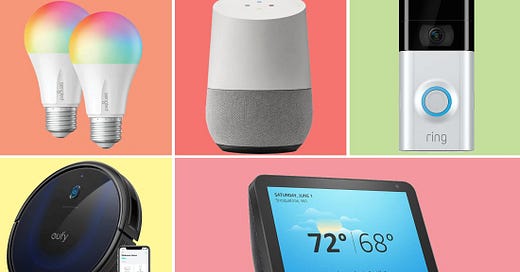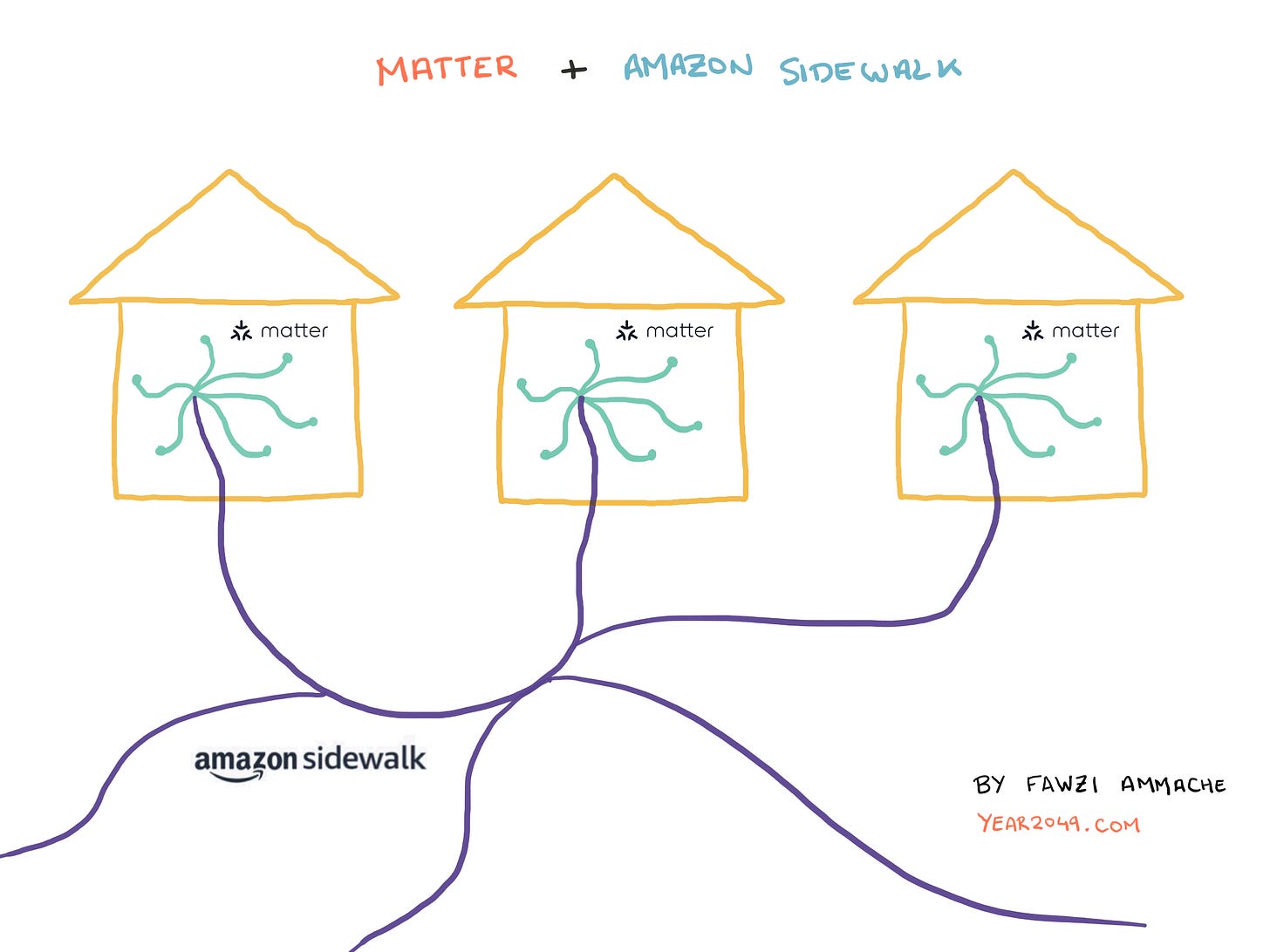Welcome to a new episode of Year 2049, your weekly guide to the events, discoveries, and innovations shaping the future of tech, climate, science, and more.
If this was forwarded to you, subscribe to get a new story in your inbox every Friday 👇
Happy Friday!
It’s officially been a month since I started this newsletter and I wanted to thank those of you who signed up so far. It’s an honour to have your attention for a few minutes every week and to be sharing this journey with you. You’re the best.
On our trip to the future this week, I want to talk about something that’s more immediate but will have long-term impacts for the decades to come and it involves every electronic device you can think of.
Hope you enjoy this one 👊
What’s the Matter?
Follow Year 2049: Instagram | Twitter | LinkedIn | Webtoon
If this was forwarded to you, subscribe so you can get my comics and stories in your inbox every Friday.
The backstory
The fragmented smart home experience
The most boring elements of our homes have increasingly become much cooler and smarter. We now have smart lightbulbs, speakers, doorbells, vacuums, and even microwaves. I’m still waiting for a smart pan that can tell me when I can flip my omelette without breaking it.
Companies like Amazon, Google, and Philips have been selling every type of smart device imaginable. But these devices don’t always integrate well together which leads to a fragmented experience. The integrations usually depend on the individual partnerships that each company has secured.
That will no longer be the case starting next year.
Turning smart devices into one big happy family
A group of smart device makers known as the Connectivity Standards Alliance (CSA) recently announced Matter, a new connectivity standard for the future of the smart home.
Matter’s goal is to unite the fragmented smart home experience that many people currently experience by creating unifying standards that allow all these different devices to integrate and communicate with one another.
Matter is a monumental step in the future of the “Internet of Things” (aka IoT). If you’re not familiar with this concept, it’s a term used to describe internet-connected devices that “talk” to each other by sending and receiving data and commands. You can read a more detailed explanation here.
F.R.I.E.N.D.S
Over 200 companies are signed up to follow the upcoming Matter standard, most notably Amazon, Apple, and Google. They’re the cool kids that currently dominate the smart home market and offer the widest selections of smart home devices. Other companies include Samsung, Comcast, Huawei, Texas Instruments, and… IKEA, who I hope is creating a smart chair that reminds me to stop slouching (are you slouching right now? did you adjust your posture? me too).
This means that starting next year, you should be able to integrate any devices made by these companies and get a fully integrated smart home experience.
Tech companies ❤️ IoT
The current state

Amazon, Apple, and Google have been investing heavily in creating and developing their own smart home ecosystems:
Amazon has integrated Alexa into many types of devices: speakers, rings, glasses, TV remotes. The Verge reported last week that Amazon is also developing a smart fridge that tracks the food and automatically delivers items that are low in stock. Read more about it here.
Apple’s smart home devices include the HomePod and Apple TV. They’ve focused mostly on partnering with select brands that integrate with their HomeKit ecosystem instead of building their own series of home devices. But, don’t forget Apple’s larger ecosystem of phones, tablets, computers, and smartwatches that are already integrated together and could be integrated with Matter-standard devices.
Google has a better track record of being more open and having more integration options. They’ve also developed an extensive catalogue of smart devices since acquiring Nest in 2014. It includes speakers, displays, security cameras, and thermostats. Google’s biggest strength is its Android operating system which powers 73% of phones worldwide.
At a surface level, the three companies are doing pretty well and are perfectly capable of building out their own ecosystems. So why do they want to follow Matter?
The battle of the virtual assistants
Alexa, Siri, and Google Assistant are the leading virtual assistants out there.
Matter integrates all types of devices, but you’ll need to control these through a virtual assistant you talk to through your smartphone or a smart speaker/display.
Alexa, Siri, and Google Assistant are competing to become your sidekick in this new, connected home of yours. The more devices they integrate with, the more value they bring to you.
If you decided to retrofit your home today and make it “smart”, would you even consider buying the Apple HomePod if you realized it had fewer integration options than an Amazon Alexa speaker? Probably not.
All three companies had to join the Matter standard otherwise they would’ve seen their main competitors reap the benefits of integration and see their own virtual assistant fall behind. Even Apple, who is very protective of its ecosystem, agreed to this. That should tell you a lot.
Amazon’s other important project
Something interesting that is happening in parallel is the launch of Amazon Sidewalk a few months ago. It’s a “mesh network” that connects all Amazon smart devices within the same neighbourhood and allows them to pass data between them across greater distances. The devices will use Bluetooth Low Energy (BLE), which has a higher range than a standard Wi-Fi network. Doing a proper explanation of this will take more than a paragraph, but here’s a short video that explains everything you need to know about Sidewalk.
Amazon’s value proposition is that this network will offer unique benefits such as keeping your devices connected even if they lose connection to Wi-Fi and even locate pets or lost items (that use Tile trackers).
The big question I have is how Amazon Sidewalk and Matter fit together. If all smart home devices will become compatible by following the Matter standard, does that imply all of these will also be compatible with Amazon Sidewalk? Will every single device in an entire neighbourhood be connected?
The good thing is that you can choose to opt-out of Amazon Sidewalk if you want to. But, it’s enabled by default so make sure to turn it off if you prefer that.
Final thoughts
It may not seem like it today, but Matter is an important standard that will have many implications on our future lives because it will govern our relationship with all the devices around us. Slowly but surely, every device and appliance possible will be connected to the internet so this is something we should be aware of.
The good thing is that tech companies are opening up their ecosystems and allowing more integrations. It’s healthier for the market and better for consumers: the barrier to entry is lower for new companies to start creating smart devices, pricing will be more competitive, and people will have more buying options.
There are obvious privacy and security concerns with connecting smart devices made by many different companies with different goals and priorities. It’s hard to judge how secure Matter is since it hasn’t officially launched yet. But having standards that everyone agrees on is an important first step. Matter’s software development kit will be released in 2022, so I’ll make sure to provide any important updates about it in future issues of Year 2049. Make sure to subscribe so you’re in the loop:
A question for you
What are your initial thoughts on Matter and how will it affect your future purchases of smart devices?
Leave a comment and let me know 👇
Deep dive
If you liked this week’s story, here are some additional links to satisfy your curiosity:
What Is Ambient Computing, and How Will It Change Our Lives? (How-To Geek)
An exhaustive list of all types of smart devices currently available (PC Mag)
If you missed the previous episode
You can pick next week’s topic
I’m running a poll on Year 2049’s Instagram page so you can pick next week’s topic. Head to @theyear2049 and choose between space construction or gene editing.
Much love,
Fawzi
How would you rate this week's edition?
















